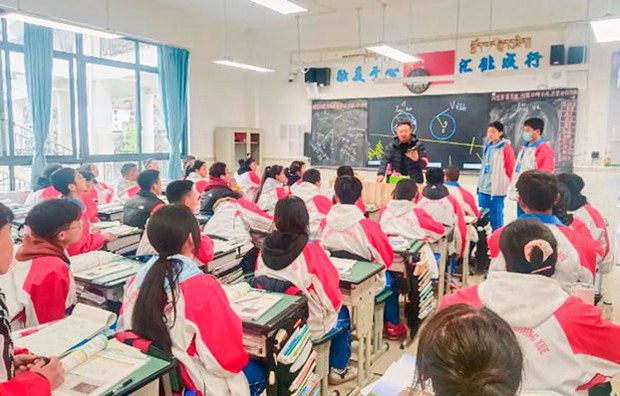Chinese authorities have banned students in schools in a Tibetan-populated area in China’s Sichuan province from speaking their native language when they communicate among themselves and with their teachers, two sources from inside Tibet said.
Students and teachers at elementary, middle and high schools in Nyagchu county, or Yajiang in Chinese, are required to use only Mandarin to communicate, they said, insisting they not be identified for fear of their personal safety.
The measure is another blow to Tibetan culture and language, which the Chinese government seems intent on wiping out and replacing with Mandarin and Han Chinese culture. Last year, a ban was imposed on Tibetan language classes in schools in another part of Sichuan province, in the Kardze Tibetan Autonomous Prefecture.
Since 2020, the Chinese government has further tightened its restrictions on language rights in Tibetan, forcing the closure of private Tibetan schools in Tibet and intensifying Chinese-language education in the schools in the name of promoting uniformity in the use of textbooks and instructional materials.
In 2021, Chinese authorities also began prohibiting Tibetan children from participating in informal Tibetan language classes or workshops during their winter breaks.
Activists fear the moves could lead to the extinction of the language in the region and endanger its viability across the country.
Limiting home visits
Authorities also have restricted the number of holidays the schoolchildren can take to limit interactions in their native tongue between them and their families, the sources said.
“Traditional breaks like spring and summer holidays, which allowed for family time, have been eliminated, forcing children to remain in boarding schools for extended periods,” the first Tibetan said.
“This separation has contributed to a decline in the number of young Tibetans proficient in the Tibetan language in Nyagchu,” he said. Tibetans make up about 90 percent of the prefecture’s 1 million inhabitants.
In the past, the Chinese government-run boarding schools allowed Tibetan children to return home on weekends and provided longer breaks during the April-June period so they could help their families with the harvesting of caterpillar fungus — a source of income for many.
But now, the children are not being sent home for these breaks, significantly limiting their contact with relatives and leading to a decline in Tibetan language fluency among the younger generation of Tibetans in Sichuan’s Kardze prefecture, said the sources.
Tibetan parents previously sought out private schools where their children could learn the Tibetan language, but the imposition of the ban in Kardze has made finding such alternative options increasingly difficult, said the second Tibetan source.
Liu Pengyu, a spokesperson at the Chinese Embassy in Washington, told RFA he did not know the specifics of this development but added that the Chinese government protects the freedom of ethnic minorities.
“In accordance with the law, the Chinese government protects the freedom of ethnic minorities to use and develop their own spoken and written languages, and the freedom of religious belief of the people of all ethnic groups,” Liu said in an email.
School closures
And yet in 2021, the Chinese government closed several private Tibetan schools, including Phende School and Chaktsa Tevey Private Elementary School in Za-Sershul county, Sengdruk Taktse School in Darlak, or Golog, county, three schools in Machen county, one school in Gadhey county, two schools in Chikdril county, and the Gedhen Buddhist School in Drago Monastery.
Each of Nyagchu county’s six towns and 10 villages has an elementary school, but these are now all residential schools — which activists term “colonial-style” and where they say Tibetan children are forcefully separated from their families and taught a Chinese-language curriculum.
It is critically important to introduce children to the Tibetan language during their formative years, said Sangye Tandar Naga, editor and department head of the Cultural Research and Publication Department at Library of Tibetan Works and Archives in Dharamsala, India.
“This early exposure is crucial because it becomes significantly more challenging for adults to learn the language later in life,” Naga told RFA Tibetan at a May 2-4 event in Dharamsala where over 24 Tibetan educators, writers and cultural scholars convened to develop strategies to preserve the Tibetan language.
The 7th Ling Rinpoche, the reincarnation of the Dalai Lama’s principal tutor, told RFA in an interview that the role of parents in teaching their children about the significance of preserving the Tibetan language is crucial to the language’s survival.








































